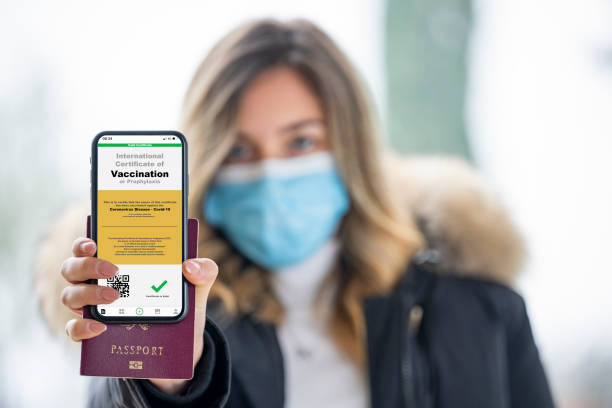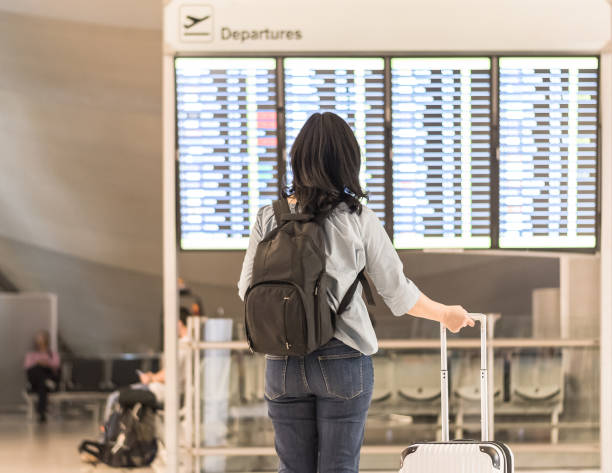VACCINE PASSPORTS: WHAT THEY ARE AND WHAT YOU NEED TO KNOW | FLIGHTLAYAWAY
We've
put together this brief primer on vaccine passports so you can learn the basics
and get informed. Of course, this is just the beginning of a long journey that
is sure to include changes, modifications, and unforeseen hiccups. No matter
what, remember that if you do plan to travel – don't forget to wear your mask
and respect all recommendations and guidelines along the way.
Vaccine Passports in Context
U.S.
President Joe Biden didn't waste any time after taking office earlier this
year, working to activate a multi-prong approach to control the COVID-19
pandemic. One of his first executive orders requested government agencies to
"assess the feasibility" of connecting vaccination certificates with
other relevant documentation and then developing digitized versions.
Thanks
to the recent announcement that the European Union will allow entry fully to
vaccinated travelers, the push for definition on the ins and outs of digital
vaccine certifications is top of mind across the globe.
In
Europe, Denmark’s government recently announced that the roll-out of a digital
passport that allows citizens to demonstrate they have been vaccinated will be
ready in three or four months.
This
isn't limited to governments, however. Airlines are also dipping their toes in
the realm of vaccine passports. For example, Etihad Airways and Emirates will soon start using a
digital travel pass which was developed by the International Air Transport
Association (IATA). The airline was also the first global carrier to fully
vaccinate 100% of its onboard crew.
The
IATA Travel Pass will help passengers manage their respective travel plans
while providing both airlines and governments with the documentation necessary
to prove they've been either vaccinated against or tested for COVID-19. This
will take the form of a mobile app and all information will be available
through QR code.
Flightlayaway has done some changes for flight booking after COVID-19. now it is easier to
book the flight at affordable prices. To get information in detail, visit the
official website.
What is a Vaccine Passport?
The
term vaccine passport refers to a unified way of storing and organizing
relevant immunization records that could be required for international travel.
In the current context, this takes the shape of a mobile app or at least a
digital version of said paperwork, but it's not always the case. It's also
important to remember that we're a ways off from a universal, one-size-fits-all
approach that works seamlessly across all countries and airlines. The shift
toward relevant vaccine passports is going to be a long-term process.
For
example, since vaccines vary from country to country — and the new COVID-19
vaccines are no exception when it comes to immunology — proving that a person is 100% immunized or
with zero risk of contagion/infection is not necessarily an easy task.
The
concept of a health or vaccine pass can also be applied to non-travel
situations, such as sporting events, live concerts or shows, and other large
gatherings of people. (To book tickets for events, visit Eventslayaway)
When – and why – would I need a
Vaccine Passport?
To
travel across international borders, government authorities might require proof
of immunization against certain viruses or illnesses. During the pandemic,
airlines and governments alike require a negative PCR test or a valid doctor's
note confirming the passenger was sick with COVID-19 and has since recovered.
The
benefit of something like vaccine passports would make it easier and more
streamlined for passengers to share this information with relevant authorities
and hopefully bypass lengthy (and expensive) quarantine protocols. Given that travelers
are supposed to foot the bill for those lengthy hotel stays, removing this
obstacle would do wonders for the international tourism industry.
Is a Vaccine Passport a new concept?
Not
at all. Vaccine passports have been around in some form or another since the
1800s. The most recent and relevant example is that of the yellow fever
vaccine. Several African countries require proof of immunization in order to
enter from abroad; travelers literally receive a "yellow card" (known
to the CDC as an International Certificate of Vaccination or Prophylaxis) after
getting the vaccine to present at the airport.
However,
the big difference is how this information is stored, archived, and
distributed. The digital component is essential to rolling out a legitimate and
effective system of vaccine passports today. While it's not a requirement for
them to be 100% digital, it would make the process easier on the whole, and
lead to both faster and higher rates of adoption among travelers everywhere. It
also adds an extra layer of security and privacy, given that the sale of fake
negative COVID-19 tests has reportedly been on the rise across the EU.
How is my information stored on a
Vaccine Passport?
For
now, given that there isn't one universal system, it depends on each product's
specific approach. For example, the CommonPass, which is linked to 300 health
systems, gives users the chance to log in to their health provider's site
within the app. In turn, the app lets the traveler know what diagnostic tests
and/or immunization records they need and generates a QR code that can be
scanned by authorities.
The
IATA Travel Pass allows authorized labs and centers to share test results and
vaccine certificates with passengers, which are stored on each individual's
phone and can be displayed to authorities through a mobile-generated QR code.
Are there any downsides to Vaccine
Passports?
It's
imperative to build ethical, sustainable, and inclusive technology that is as
intersectional as possible. As first
published in the New York Times, "In a world where more than a billion
people aren’t able to prove their identity because they lack passports, birth
certificates, driver’s licenses or national identification cards, digital
documents that show vaccine status may heighten inequality and risk, leaving
many people behind."
At
the very least, for travelers without smartphones, there will need to be a
universally accepted paper version of a vaccine passport or health certificate.
Additionally, concerns about data privacy and sharing are completely valid.
Experts warn against companies or governments monopolizing the process and
development, urging for transparency and accessibility every step of the
way.
One final friendly reminder
Though
we've all started 2021 with renewed hope and optimism, it's important to
remember that we still have a long way to go. Even if you're vaccinated, that
doesn't mean you can stop wearing a mask or following other social distancing
measures while you're out and about. We need to remain patient as the research
rolls in from scientists and experts about the long-term efficacy of the
different vaccines, as well as if or how vaccinated people can transmit the
virus to others.




Comments
Post a Comment